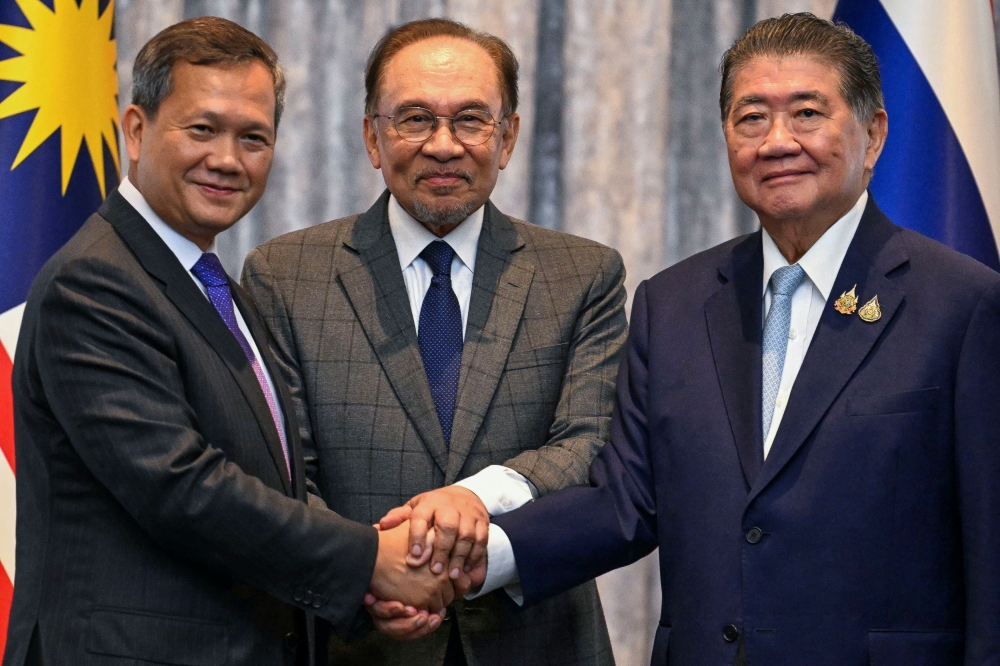AUGUST 1 — As the smoke clears — however faintly — over the Thai-Cambodian frontier, a rare window for diplomatic resolve is upon Asean (again). The General Border Committee (GBC) meeting, scheduled for August 4, 2025, was initially set to be held in Phnom Penh. But in light of the acrimonious exchanges, errant artillery fire, and displaced families numbering in the hundreds of thousands, Thailand’s formal request to move the GBC to neutral Malaysia is not just prudent — it is essential.
Malaysia, currently chairing Asean, must rise to the moment. For too long, border disputes in the region have been dismissed as low-intensity skirmishes, beneath the threshold of international alarm. But make no mistake: the violence between Thailand and Cambodia risks spiraling into a full-blown conflict if this opportunity for high-level coordination slips away.
The stakes are high. Nearly 300,000 civilians have been displaced across both sides of the border. The Thai military, feeling encircled politically and emboldened militarily, has hardened its posture. Cambodia, led more visibly by Hun Sen than by his son Prime Minister Hun Manet, has refused to budge from its historical cartographic claims, citing the sanctity of its 1:200,000 scale map. Thailand, for its part, insists on a far more granular 1:50,000 version produced by its Royal Survey Department with American technical assistance.
It may seem like a battle of cartographic preferences. It is anything but. These duelling maps represent deeply entrenched narratives of sovereignty, national trauma, and colonial betrayal. They cannot be reconciled overnight — but what can be agreed upon is the need for a third-party venue that both sides can trust.
Enter Malaysia.
Prime Minister Anwar Ibrahim’s quiet but firm diplomacy since the eruption of hostilities has drawn cautious praise from all sides, including the United States, China, and key Asean partners. His call on July 26 — the second day of the border violence — for an immediate cessation of hostilities helped broker an initial halt in shelling, albeit one that broke within an hour. Still, his voice has carried moral authority unmatched in the region today.
Malaysia has no territorial interest in this dispute. Unlike the Philippines or Vietnam in the South China Sea, or Laos in the Mekong River tension with Thailand, Malaysia’s neutrality is unimpeachable in the Thai-Cambodian theatre. Furthermore, Malaysia’s standing as the Asean Chair in 2025, with Laos and the Philippines lined up for the following years, places Kuala Lumpur in a critical intermediary role.
Thailand’s request to move the GBC to Malaysia from August 4 to 7 signals its recognition of that neutrality. More importantly, it acknowledges Malaysia’s administrative competence and its diplomatic seriousness. For Cambodia to refuse this request would be to cast unnecessary suspicion on Malaysia’s intentions — when, in fact, the very credibility of Asean as a conflict management platform is on the line.
Asean has to be clear: if Malaysia declines to host the GBC, or if Cambodia refuses to shift the venue, the momentum toward peace may be lost altogether.
The alternative is grim. Every day of delay brings new fatalities, erodes ceasefire discipline among field commanders, and offers spoilers — rogue officers, black marketeers, and political opportunists — ample space to sabotage peace.
Nor should the international backdrop be ignored. President Donald Trump, newly returned to office, has signalled readiness to impose punitive tariffs on Cambodia (49 per cent) and Thailand (36 per cent) should fighting resume. His administration, under the revived framework of “Asia First,” sees regional instability as a direct threat to American economic and security interests. Whether one agrees with this framing or not, the external pressure adds urgency to Asean’s internal mediation efforts.
Malaysia must act with both humility and firmness. Hosting the GBC is not a bid for glory. It is a necessary act of regional responsibility. The infrastructure is already in place — Putrajaya can welcome the defence ministers, foreign ministers, and military commanders of both sides under an Asean banner that still retains diplomatic weight.
What is needed now is Cambodian consent.
If Phnom Penh insists on hosting the GBC in its own capital, it risks politicizing the venue and losing the confidence of the Thai delegation. This is no time to cling to symbolic pride. The goal is not to win a venue dispute — it is to end a border conflict.
The General Border Committee must not be reduced to a diplomatic sideshow. Its mandate—to streamline coordination between border patrols, monitor ceasefire lines, and agree on verification protocols — is the bedrock upon which any sustainable peace must be built.
Cambodia and Thailand owe it to their people to make this work. Asean owes it to the region. And Malaysia owes it to its leadership role to ensure this critical meeting takes place on schedule, on neutral ground, and under terms that inspire confidence.
Peace is not a given. It is a process. And that process begins on August 4 — not in Phnom Penh, but in Putrajaya.
*Phar Kim Beng PhD is Professor of Asean Studies, International Islamic University of Malaysia and Director of Institute of Internationalisation and Asean Studies (IINTAS).
**This is the personal opinion of the writer or publication and does not necessarily represent the views of Malay Mail.







